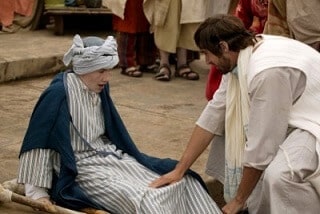
The great Thomas Aquinas once said, “There is more to the Church than Jesus and more to Jesus than the Church.”
Some young people stay away from the Church because, in their judgement, “the people there are hypocrites.” And, to some degree they are right. There are some church attendees who do not “walk the talk.” This bears truth to Aquinas’ statement that there is more to the Church than Jesus. On the other hand what these young people do not admit, is that Jesus is truly in the Church as well, and there are many in the Church who do “walk the talk.”
The other side of this coin comes with those who think the work of Jesus is limited to what happens in the Church. These are like the group of Pharisees who thought that God was bound by the structures of the Mosaic Law. They couldn’t accept the fact that there was much more to God than what was institutionalized in the Law.
Today we read a story in which Jesus acted well outside the bounds of Judaism. He surprises us in the way he healed a paralytic (John 5:1-16).
“Now there is in Jerusalem at the Sheep Gate a pool called in Hebrew Bethesda, with five porticoes. In these lay a large number of ill, blind, lame, and crippled.”
The reason the sick people lay around this pool is that at unexpected moments an angel would come to stir the waters, and the first one to jump in the pool received a miraculous healing. We note that this pool was outside the Temple bounds and was an unlikely place for God to reveal his healing power. His work there, unlike the programmed services at the Temple, was unpredictable. No one knew when or how he would give the water healing power. God made it clear that he would not be controlled or bound by the prescriptions of the Jewish customs.
As we read on, we learn that a certain paralytic had been lying there for “38” years, and had never been the first to reach the water. When Jesus asked him if he wanted to be made well, the man replied,
“Sir, I have no one to put me into the pool when the water is stirred up; while I am on my way, someone else gets down there before me.”
Even in this “mercy pool” the strongest were the ones who were healed. The weak ones weren’t fast enough. There were flaws in this “outside the Law” work of God. It did not allow for the least to be ministered to. Jesus, just an ordinary person walking through the crowd, told the man,
“Rise, take up your mat, and walk.” Immediately the man became well, took up his mat, and walked. Now that day was a Sabbath.”
Jesus’ action went beyond the custom of the “first one in gets healed,” happened outside the Temple precincts, and took place on the Sabbath, when healing services were prohibited. Through Jesus, God made it clear that human restrictions had no power over him. He is boundless in his mercy.
If we read this passage closely, we notice that Jesus did not lay hands on the man, say a prayer, or act in a “religious” way. He just told the man to “rise” and the man did. No one in his right mind could interpret this as a “healing rite.” How could anyone call this a Sabbath violation? It was an extraordinary intervention of God at an unexpected place in an unexpected moment. Yet those who wanted to keep God inside a religious box used this incident to persecute Jesus! They were angry that they couldn’t control the works of God.
As we point our fingers at the Pharisees, we must also point our fingers at ourselves. There is a part of us that wants to keep God in our religious box. We expect that he will “obey” our prayer requests when and where we expect him to. We limit our expectations of meeting Jesus to the church services we attend. When we walk out of church, we often find ourselves saying goodbye to Jesus as well.
Until we are set free from this mentality, we will be blind to those unexpected moments in which Jesus, seeming to be an ordinary person, walks through the crowd, engages us in a short conversation, and tells us to rise, take up our mats, and walk. How many times have we missed a visit from Jesus because we were too preoccupied with trying to figure out how to beat everyone else to the “healing pool?”
Jesus will visit me today; he will talk to me; he will offer me God’s mercy and healing grace. Will I recognize him? Will I rise up out of the paralysis of misery, take up my mat and walk?
“Come behold the deeds of the Lord, the astounding things he has wrought on earth” (Ps 46:9)
